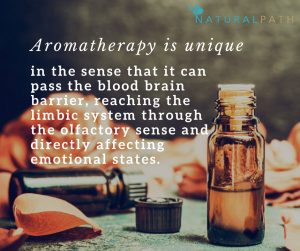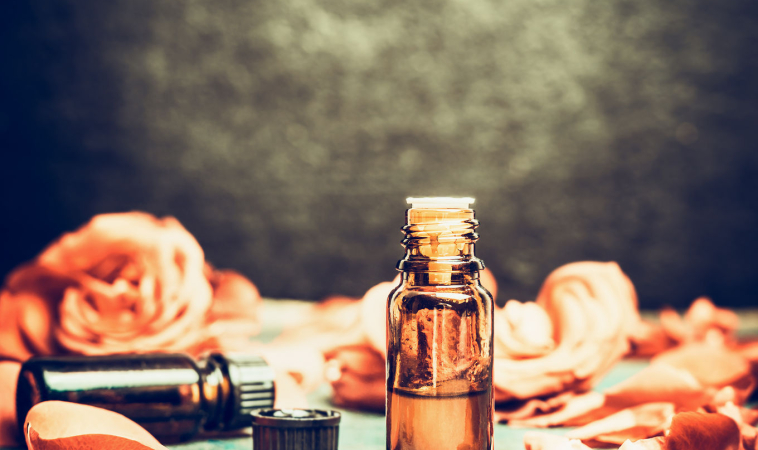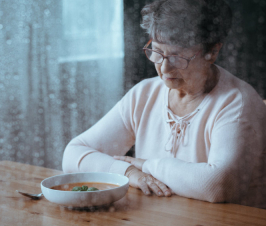Essential Oils and More for the Winter Blues
 Feeling blue or irritable with the change of seasons and sunlight? There are many interventions that have been known to help with mood disorders such as seasonal affective disorder (SAD), as well as depression, anxiety and stress. Interventions such as light therapy, vitamin D, exercise, yoga, fish oil, B vitamins and many other herbal medicines are known popular treatments for mental health concerns.
Feeling blue or irritable with the change of seasons and sunlight? There are many interventions that have been known to help with mood disorders such as seasonal affective disorder (SAD), as well as depression, anxiety and stress. Interventions such as light therapy, vitamin D, exercise, yoga, fish oil, B vitamins and many other herbal medicines are known popular treatments for mental health concerns.
Aromatherapy is unique in the sense that it can pass the blood brain barrier, reaching the limbic system through the olfactory sense and directly affecting emotional states.
Have you tried essential oils for mood yet? Here is some pretty great evidence supporting the benefit of aromatherapy for mental health concerns:
Seasonal Affective Disorder
Research has shown that aromatherapy is effective in reducing symptoms of SAD by decreasing depression, feelings of hostility and tension anxiety that occur with this disorder1. A combination of lavender, lemon and peppermint essential oils was more effective than either oil alone in lowering blood pressure, heart rate and improving mood in study participants with SAD. For other ways to manage this seasonal mood change, try exercising, getting fresh air, keeping your social contacts and getting your vitamin D levels checked by a Naturopathic Doctor or Medical Doctor.
Anxiety & Sleep
Lavender
Lavender essential oil is well known for reducing feelings of anxiety and promoting relaxation to aid with sleep. A study of patients in coronary intensive care units showed improvements in sleep and anxiety levels after inhaling lavender scent for 15 days, as seen on the patient objective reports PSQI (Pittsburgh sleep quality index) and BAI (Beck Anxiety Inventory) scale2. Try diffusing or inhaling the scent at times of heightened anxiety or before bed.
Bergamot
Bergamot, a citrusy scent extracted from fruits of an evergreen tree species has anti-anxiety and anti-depressant effect. Different physiological parameters were affected after inhaling bergamot essential oil for a 15-minute interval. Cortisol levels, which are heightened during times of stress and anxiety, were significantly reduced in the essential oil group in comparison with the individuals who rested instead of inhaling an essential oil3.
Depression
Lavender
A study using a blend of Rose (Rose otto) and Lavender (Lavandula angustifolio) essential oil for the prevention of anxiety and depression in high-risk postpartum women yielded positive results. At the midpoint and final intervals of the intervention, the aromatherapy group had significant improvements in the GAD-7 (Generalized Anxiety Disorder Scale) and EPDS (Edinburgh Postnatal Depression Scale)4.
Rose
Other studies using Rose oil (Rosa damascena) were shown to reduce depression-induced oxidative stress in the rat brains. This has implications for rose oil’s supposed benefit for reducing depression5. In a human study, rose oil significantly reduced depression and stress-related measures such as breathing rate and systolic blood pressure while promoting a subjective feeling of relaxation6. Another beneficial effect of rose oil is in the reduction of SSRI-induced sexual dysfunction, which is a common side effect of anti-depressant medication7.
Stress
Lavender
A recent study this year found that postpartum mothers who inhaled lavender essential oil for 4 weeks every 8 hours had a significant reduction of stress, anxiety and depression scores after the 2-week mark4. Lavender essential oil is a staple for anyone who wants to reduce stress and prevent depression and anxiety long-term.
Lemon oil
Have you ever felt content and exhilarated after smelling a fresh lemon or using cleaning materials with lemon as an ingredient? This “uplifting” oil acts as a natural anti-depressant by reducing the effects of stress on the brain. Through its interaction with the brain, lemon essential oil acts to increase dopamine in the hippocampus and 5-hydroxytryptophan (5-HTP) in the prefrontal cortex and striatum. These are both neurotransmitters that are important in improving a sense of wellbeing.
If you or someone you know is experiencing a mood imbalance or mental health concern it is important to receive an evaluation through an MD and Naturopathic Doctor so that you can receive adequate care. Naturopathic Medicine provides many supportive, complementary and alternative therapies for mental health conditions such as SAD, anxiety, depression and stress. There are many ways that the negative effects of mood changes can be alleviated for you to live a full and meaningful life.
 Dr. Kaitlyn Zorn, HBSc., ND., is a Registered Naturopathic Doctor practicing in Guelph, Ontario, at Healing Foundations Naturopathic Clinic. Kaitlyn considers herself a general family practitioner, seeing a variety of concerns, however, has a keen interest in mental health (stress, anxiety & depression), hormonal imbalances (women’s health, adrenal & thyroid conditions) and digestive concerns (food sensitivities, bloating, indigestion). She can work with you to reduce your stress, balance hormones and improve digestion alongside providing a treatment plan that is individualized for your unique concern. Most importantly, Kaitlyn helps to empower you to be your best self so you can live your life to the fullest. Did you know that most extended coverage plans offer some coverage for naturopathic services? Look into yours today and book either a complimentary 15-minute Meet & Greet or an Initial Consultation at [email protected]. Stay in the loop with Kaitlyn by following her on Instagram: @drkaitlynzorn.nd and Facebook: www.facebook.com/drkaitlynzornguelph/
Dr. Kaitlyn Zorn, HBSc., ND., is a Registered Naturopathic Doctor practicing in Guelph, Ontario, at Healing Foundations Naturopathic Clinic. Kaitlyn considers herself a general family practitioner, seeing a variety of concerns, however, has a keen interest in mental health (stress, anxiety & depression), hormonal imbalances (women’s health, adrenal & thyroid conditions) and digestive concerns (food sensitivities, bloating, indigestion). She can work with you to reduce your stress, balance hormones and improve digestion alongside providing a treatment plan that is individualized for your unique concern. Most importantly, Kaitlyn helps to empower you to be your best self so you can live your life to the fullest. Did you know that most extended coverage plans offer some coverage for naturopathic services? Look into yours today and book either a complimentary 15-minute Meet & Greet or an Initial Consultation at [email protected]. Stay in the loop with Kaitlyn by following her on Instagram: @drkaitlynzorn.nd and Facebook: www.facebook.com/drkaitlynzornguelph/
References:
- Dong, Jacob (2016). Combined non-adaptive light and smell stimuli lowered blood pressure, reduced heart rate and reduced negative affect. Physiol Behav. (156) pp.94-105.
- Karadag, Samancioglu, Ozden, Bakir (2015). Effects of aromatherapy on sleep quality and anxiety patients. Nurs Crit Care. Doi: 10.1111/NICC.12198.
- Watanabe, Kuchta, Kimura, Rauwald, Kamei, Imanishi (2015). Effects of bergamot (Citrus bergamia) essential oil arompatherapy on mood states, parasympathetic, nervous system activity and salivary cortisol levels in 41 healthy females. Forsch Komplementmed. 22(1) pp. 43-9.
- Conrad, Adams. The effects of clinical aromatherapy for anxiety and depression in high risk postpartum woman – pilot study. Complement Ther Clin Pract. Vol. 18(3) pp. 164-8.
- Naziroglu et al (2013). Rose oil (from Rosa x damascene Mill.) vapor attenuates depression-induced oxidative toxicity in rat brain. J Nat Med. 67(1) pp. 152-8.
- Hongratanaworakit (2009). Relaxing effect of rose oil on humans. Nat Prod Commun. 4(2)pp.291-6.
- Komiya, Takeuchi, Harada (2006). Lemon oil vapor causes an anti-stress effect via modulating the 5-HT and DA activities in mice. Behav. Brain Res. 172(2) pp.240-9.


















Best article,Thank you.
It’s amazing.